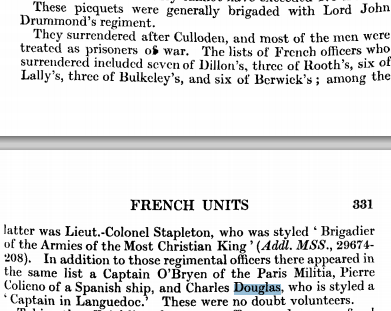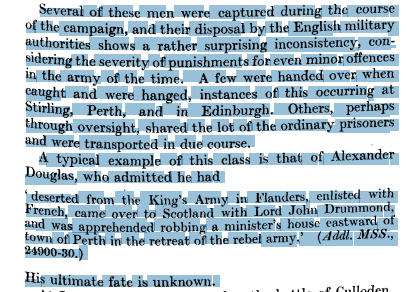|
| |
The French, Jacobites and the Douglas family
|
|
|
|
This page is a stub.
It is a collection of notes relating the French involvement in the
Jacobite cause.
• Alexandre-Pierre de Mackensie-Douglas
(sic) or Mackenzie-Douglas, baron de Kildin (1713-1765) was a Jacobite in French service. According to the
memoirs of the Chevalier d'Eon, King Louis XV of France sent d'Eon and
Mackenzie-Douglas on a secret mission to Russia in order to meet Empress
Elizabeth (reigned 1741-1762) and to conspire with the pro-French
faction in Russia against the Habsburg monarchy.
He served as the official French chargé d'affaires in St Petersburg from
1755 to 1756 following the re-establishment of Franco-Russian diplomatic
relations, which had been broken off in 1748.
Mackensie-Douglas's tombstone was re-discovered in France in 2015
•
Charles-Joseph Douglas,
born in 1720, died without posterity in 1788, and Joseph Douglas, born
in 1721, ambassador of France in Russia, died without posterity,
attached in their youth to the party of Stuarts, followed in 1745 Prince
Edward in Scotland and were taken prisoner at the Battle of Culloden.
• Captain Charles Guillaume Douglas and Captain d'Hortore Douglas,
Capitaine dans le regiment de Languedoc and Capitaine dans le regiment
de Drummond ou Royal Ecossais (though not necessarily respectively) were prisoners
of the '45 at Penrith
• Charles Joseph and Joseph-Marie Chevalier said Douglas belong to
an ancient family of Scottish descent, came from Picardy and installed
in the Bugey since the seventeenth century. Son of Charles Douglas,
trustee of the nobility of Bugey and Marie Lilia, they were born in
Montreal near Nantua, as is their brother François-Prosper Douglas. The
three brothers served in the regiment of Languedoc. Joseph-Marie enters
in 1739 as a cadet before moving to the bodyguards of Villeroy. The
elder Charles Joseph enters as a cadet in 1740, became a second
lieutenant in 1742 and lieutenant in 1744. François-Prosper is a second
lieutenant in 1743, lieutenant in 1744 and in 1746 became captain of a
company in the 2nd battalion. Charles Joseph and Marie Joseph pursue
their career in the Royal Scots, one as second captain in 1744 and the
other as a lieutenant. Both were captured in 1746 after the
Battle of Culloden. Charles-Joseph
becomes captain of a company in 1748 when his brother became first mate
the previous year. In 1751 Charles Joseph abandons his company to his
brother who becomes captain, and was appointed Governor of Saint-Claude
in 1751
• These two officers appear in the List of Prisoners as Captain
Charles Guillaume Douglas and Captain d'Hortore Douglas respectively.
Charles William Douglas from
Regiment: Irish Piquets Rank: Captain
Prisoner at: Inverness
William spelt Guillaume Surrendered at Inverness on 16 April 1746 and
signed his parole on 17 April 1746. Pardoned on condition of permanent
banishment. Discharged.
Douglas d'Hortore from France
Regiment: Ecossais Royale Rank: Captain
Prisoner No.: 691 Prisoner at: Inverness, Penrith
Surrendered at Inverness on 16 April 1746 and signed his parole on 17
April 1746.
Imprisoned at Penrith. He was a signatory to the appeal by Lord Louis
Drummond on behalf of Captain James Hay of the French Royal Scots on 22
September 1746. Pardoned on condition of permanent banishment.
Discharged.


I leave it to you to decide how many different people are listed above.
And I welcome any contribution.
See also:
• The Douglas family in France
|
Source
Sources for this article include:
Any contributions will be
gratefully accepted
|
|


